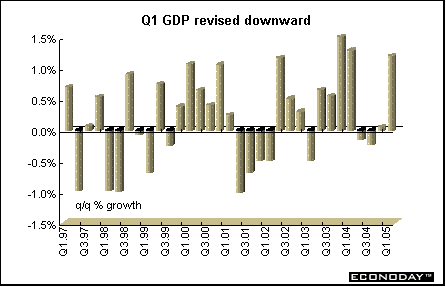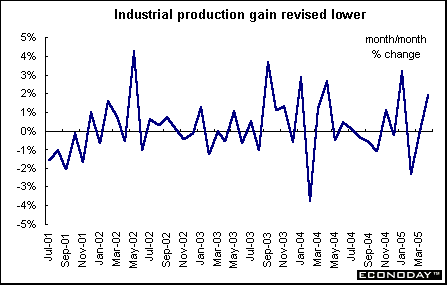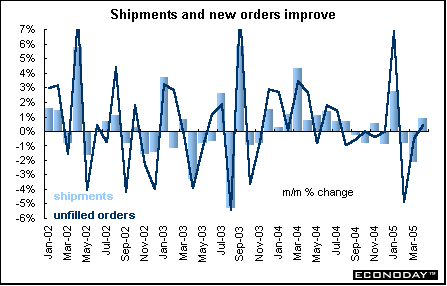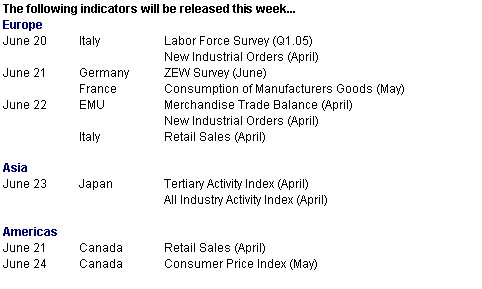Monday, June 20, 2005

Global Markets
The Organization of the Petroleum Exporting Countries (OPEC) raised its production quotas once again and unofficially raised its price target for a basket of crudes to more than $50 a barrel on Wednesday. The reasons cited were firm demand growth, refining bottlenecks and lack of economic damage from high oil prices. The additional 500,000 barrels a day lifts production to 28 million barrels per day and is in line with actual output. OPEC said it would raise quotas by the same amount over the next few months if prices increase by at least $2 more above current levels - which are in the $56 per barrel range.

The OPEC reference basket price, which originally was introduced on January 1, 1987, is the arithmetic average of seven selected crudes and includes Saharan Blend (Algeria), Minas (Indonesia), Bonny Light (Nigeria), Arab Light (Saudi-Arabia), Dubai (United Arab Emirates), Tia Juana Light (Venezuela), and Isthmus (Mexico). Mexico is not a member of OPEC. For the new basket to increase above $50 a barrel, U.S. and European benchmark crude would have to be about $57 to $58 a barrel. With most OPEC countries producing at or very close to full capacity, any increase in supply is expected to come from Saudi Arabia, the world's largest exporter of oil. OPEC ministers deflected any blame for the high oil price onto bottlenecks in the global petroleum refining sector.
Equities pretty much ignored OPEC's intention to increase production and instead focused on a decline in the weekly U.S. oil inventory numbers, if only momentarily. On the week, equities indexes followed here were up with the exception of the Hang Seng and STI in Asia.
Global Stock Market Recap

Europe and Britain
Despite the brouhaha over the European Union summit meeting - the first since the French and the Netherlands voted no on the proposed constitution - European stocks seemingly went their own way and had a banner week. The DAX and CAC climbed close to three-year highs; soaring crude prices did little to stymie the climb. Mining stocks such as BHP Billiton and Rio Tinto Group paced gains on optimism that higher demand for metals will boost profits. In the UK, stocks also were up as the FTSE 100 firmed its footing over the 5000 mark. Disappointing economic data for retail sales did not seem to deter investors.

Asia/Pacific
Asian/Pacific stocks were up last week, led by commodity companies such as BHP Billiton, after commodities prices climbed on optimism that expanding economies in the U.S. and China will bolster demand for oil and metals. Both the Nikkei and Topix were up, bolstered by exporters such as Toyota Motor Corp. after U.S. housing starts were higher than analysts expected, boosting confidence that consumer demand in Asia's largest market will be sustained. Both the Nikkei and Topix are over their year-end 2004 levels. The all ordinaries also gained on the prospects for commodity firms. Both the Hang Seng and STI were down slightly on the week. The Hang Seng is the only Asian index followed here below its year-end level.

The Bank of Japan left monetary policy unchanged after their two-day meeting. Interest rates remain at zero while the Bank continues to flood the market with funds - the amount made available to lenders remained between ¥30 trillion yen ($274 billion) and ¥35 trillion yen. The good news from the Bank was their more positive spin on the economy's health. In its monthly report, they said that the economy continues to recover because of higher capital investment and consumer spending. They said that household income is rising moderately as the employment situation improves and wages have stopped declining. But consumer prices will likely continue to decline slightly, the bank said, as lower costs for utility charges push down prices. Core consumer prices (the CPI less fresh food), the benchmark measure the bank uses to conduct monetary policy, have only risen one month since April 1998.
Currencies
The euro's decline ground to a halt as traders were hesitant to push the currency below $1.20 per euro. For some time now, it has seemed as if every news item was negative for the euro and positive for the dollar. On the political front, in addition to the no votes on the constitution, the escalation in bickering over the EU's budget gives the impression of a fractious Europe lacking leadership. To exacerbate the situation, there has been a string of weak economic data confirming the anemic state of the economy. Interestingly, equity investors appear to be looking elsewhere and have been buying stocks as the euro declined despite the gloomy economic outlook. The resurgent U.S. dollar hit a new nine-month high against the euro amid expectations of an ever-widening yield differential between the U.S. and EMU. European politicians were unrestrained in their glee, saying that the dollar was still over-valued. The weaker the euro the more it helps the large export sectors of the European economy especially in Germany and Italy - two of the sicker economies.

Another factor in the dollar's rising value, not only against the euro, but the yen as well is that the big banks are also increasingly reporting large repatriation flows by U.S. multinationals under the auspices of the Homeland Investment Act, a year-long tax break designed to encourage U.S. companies to bring home earnings held abroad. Repatriation had been held up by uncertainty over the accounting treatment of the money, but with these issues now overcome, JP Morgan believes U.S. companies will repatriate at least $100 billion before the end of the year, most of which would be converted from euros.
On Friday however, the dollar lost ground due to a series of events. The dollar's declined against the euro after ECB council member Klaus Liebscher suggested the ECB is not preparing to reduce interest rates. Then the closure of diplomatic missions in Lagos, Nigeria by the U.S., U.K. and Germany because of security threats pushed the dollar down more. The dollar tends to drop during terrorism scares because the U.S. is viewed as a primary target. Further downward pressure on the dollar occurred after the U.S. first quarter current account deficit widened to a record $195.1 billion. The current account is a measure of trade, services, tourism and investments. The larger shortfall means that more dollars need to be converted to other currencies to pay for imports. The dollar remained lower even though U.S. consumer sentiment was up in June and leaders at the EU summit seemed to agree only on disagreeing.
Indicator scoreboard
EMU - May harmonized index of consumer prices was up 0.2 percent and 1.9 percent when compared with last year. HICP excluding energy, food, alcohol and tobacco was up 0.3 percent and 1.6 percent on the year. Prices were up for packaged holidays, fruit, accommodation services and district heating. Price declines occurred for heating oil, transport fuels and telecommunications. HICP excluding energy and unprocessed food was also up 0.3 percent and 1.6 percent on the year. The latter is the preferred inflation measure of the ECB.

April industrial output was up 0.6 percent and 0.9 percent when compared with last year. Energy goods were down but durable consumer goods, intermediate goods and nondurable consumer goods were up on the month.

Germany - May producer price index was unchanged and up 4.1 percent when compared with last year. Excluding energy, the PPI was down 0.1 percent and up 2.1 percent on the year. Energy prices were up 0.1 percent and 11 percent on the year. Basic goods were down 0.3 percent and up 3.5 percent on the year. Investment goods prices inched up 0.1 percent and were unchanged on the year.

Italy - April seasonally and workday adjusted industrial production jumped by 1.9 percent and was up 0.8 percent when compared with last year. April's increase was the strongest month-on-month gain since April 1997. Output of consumer goods, investment goods and intermediate goods were all up on the month. However, energy output was down.

April world merchandise trade deficit worsened to €1.354 billion from €845 million in the previous month and €155 million a year ago. Exports were up 1.5 percent while imports soared 6.5 percent on the year. As to be expected, the sharpest import increases were for energy, gas & water as well as for refined petroleum products on the year. Interestingly, the largest export gain was also for refined petroleum products.

Britain - May output producer prices were down 0.2 percent and up 2.7 percent when compared with last year. Core output prices which excludes gasoline, tobacco, food and beverages, was up 0.1 percent and 2.5 percent on the year. The drop in crude oil prices more than offset increases for home produced food and other items. Seasonally adjusted input prices were up 0.3 percent and 7.8 percent on the year. Crude oil prices dropped 3.1 percent but were up 22.9 percent on the year.

May consumer price index was up 0.4 percent and 1.9 percent when compared with last year. Higher food costs were offset by easing gasoline prices. Food prices, thanks to higher prices for poultry and fruit (especially strawberries), were up 0.7 percent and 1.4 percent on the year. Gasoline prices were down 0.5 percent and up 4.8 percent on the year. Retail price index excluding mortgage interest payments was up 0.2 percent and 2.1 percent on the year.

May claimant count unemployment was up for the fourth month by 13,200 after climbing 10,800 in April. Despite this, the claimant count unemployment rate remained at 2.7 percent. International Labour Organization unemployment for the three months ending in April was down by 15,000 when compared with the previous three month period ending in March. The ILO unemployment rate remained at 4.7 percent. The jump in claimant unemployment reflected layoffs from the closure of the Rover motor vehicle plant. ILO employment was up by 11,000 jobs for the three months ending in April.

Average earnings for the three months ending in April was up by 4.6 percent when compared with the same three months a year earlier. Excluding bonuses, average earnings climbed by 4.1 percent for the second three months. Private earnings were up 4.7 percent as were earnings in the public sector. Manufacturing earnings were up 3.6 percent while service sector earnings were up 5.1 percent. The Bank of England has a target of 4.5 percent for average earnings.

May retail sales volumes edged up 0.1 percent and were up 1.3 percent when compared with last year. This was the weakest annual growth since March 1999. Sales for non-store retailing and repair as well as for non-specialized stores were down. But these declines were offset by household goods and other store sales.

Asia
Japan - First quarter gross domestic product was revised to a gain of 1.2 percent from the 1.3 percent originally reported. On an annualized basis, GDP was up a revised 4.9 percent from the 5.3 percent originally reported. The main factor behind the downward revision was private inventories. Nominal GDP, which isn't adjusted for price changes, was left unchanged at 0.6 percent. The GDP deflator was revised down to minus 1.0 percent compared with a preliminary minus 1.2 percent. The revision in the deflator also contributed to the downward revision to real GDP. Consumer spending was up 1.1 percent. Domestic demand added 1.3 percentage points to GDP, down from 1.4 points as initially reported.

April industrial output was revised to a gain of 1.9 percent from the 2.2 percent originally estimated. Drug production accounted for some 60 percent of the revised lower output. Industrial production was up 1.5 percent when compared with last year.

Americas
Canada - April manufacturers' shipments were up 0.9 percent and 3.1 percent when compared with last year. Unfilled orders were up 1.1 percent and 5.9 percent on the year. Excluding the aerospace industry, unfilled orders remained up 0.6 percent. New orders were up 0.4 percent and 2 percent on the year. The aerospace products & parts, primary metals and fabricated metals were the main contributors to the increase in orders. New contracts received in the transportation equipment sector were largely responsible for the increase. Excluding the transportation sector, new orders slipped 0.3 percent.

Bottom line
The EU summit, which met on Thursday and is meeting today (Friday), has agreed on one thing. It announced that the original ratification deadline of the Constitution of November 2006 no longer applied. Several countries including Sweden and the Czech Republic said they would delay ratification until its future was clear. This in effect leaves the document, in its current form, dead. The other issue on the agenda is the EU's budget for 2007 to 2013. One of the more divisive issues is who gets what. One of the reasons the constitution was voted down in the Netherlands was because the nation pays the highest per capital contribution to the EU, which most Dutch think is unfair. The issue is complex, rancorous and not for discussion here. But at this writing, agreement on a budget seems slim.
Looking Ahead: June 20 through June 24, 2005




